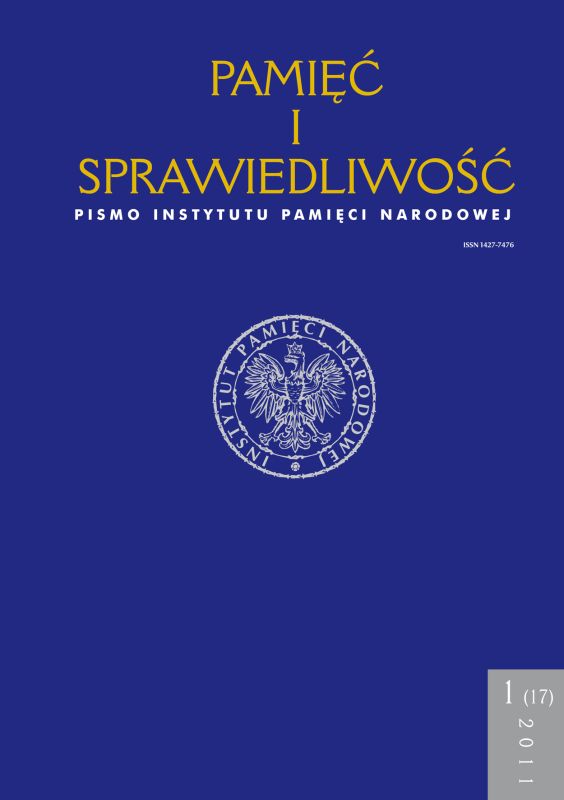Cena lojalności wobec II Rzeczypospolitej. Wywłaszczenie Habsburgów żywieckich przez narodowosocjalistyczne Niemcy 1939–1944
Pamięć i Sprawiedliwość, Tom 17 Nr 1 (2011), strony: 231-245
Data publikacji: 2011-06-30
Abstrakt
In the autumn of 1939, the National Socialist Germany occupying Poland, started imposing a Germanisation policies in the newly incorporated into the Third Reich territories of the Second Polish Republic. The most effective methods of removing Polish identity – apart from elimination of the leadership – were Polish people displacement and dispossession.
First months of the occupation were aimed at a gathering information about people living in areas annexed by the Nazi Germany.
In 1939, a police population census was taken in the Province of Silesia. The Żywiec District was considered to be unique thanks to its mountainous terrain and enormously rich tree cover which were looked on by German authorities as a great potential both for the timber industry development and for the expansion of the tourist sector in the Żywiec Region.
Several dozen hectares of mainly spruce forests belonged to the Habsburgs of Żywiec line. From the very beginning of the German occupation, due to the fact that Karl Albrecht and his spouse Alice – landowners of nearly 30 thousand hectares of forests and of the brewery – had a good relationship with the authority elites of the Second Polish Republic during the inter-war years, they met
with deep distrust expressed by German secret police apparatus. The Gestapo got completed very quickly all the materials confirming not only Karl’s sympathy for Polish identity but also his financial support of Polish military efforts. In September 1939 he volunteered to the Polish Army, then in November he was
imprisoned and his wife with children were put under house arrest.
From that time until the spring of 1943, a discussion on a future of the Habsburgs’ fortune started. From March 1941, despite of the pressure from the Gestapo, the Habsburgs consistently refused to sign the German People’s List (Volksliste) ostensibly demonstrating their support for Poland and their contempt for
the National Socialist regime. It ended definitely in the autumn of 1942 when they were sent to the Third Reich as labourers and their whole property was took over.
A different fate awaited countess von Montjoye – Leo Karl Habsburg’s widow, brother of Karl Albrecht. She inherited over 10 thousand hectares of forests and many agricultural estates. During her talks with representatives of the Nazi Party and police she always emphasized her and her children’s deep attachment to the German language, culture and nationality. The problem of whether to accept her registration in the Volksliste (Heinrich Himmler was very dubious of it) as well as the issue of Karl Albrecht and Alice, became, during the occupation, a top-level
discussion in the Third Reich.
Inne teksty tego samego autora
- Mirosław Sikora, Współpraca Departamentu I MSW z Hauptverwaltung Aufklärung MfS w zakresie tajnego pozyskiwania nowych technologii dla przemysłu PRL i NRD w latach 1975–1990 , Pamięć i Sprawiedliwość: Tom 29 Nr 1 (2017)
- Mirosław Sikora, Zasady i praktyka przejęcia majątku polskiego przez III Rzeszę, ze szczególnym uwzględnieniem sektora rolnego oraz mieszkaniowego, na przykładzie prowincji śląskiej (górnośląskiej) w latach 1939–1944 , Pamięć i Sprawiedliwość: Tom 13 Nr 2 (2008)
- Mirosław Sikora, Zasady i praktyka przejęcia majątku polskiego przez III Rzeszę, ze szczególnym uwzględnieniem sektora rolnego oraz mieszkaniowego, na przykładzie prowincji śląskiej (górnośląskiej) w latach 1939–1944 , Pamięć i Sprawiedliwość: Tom 14 Nr 1 (2009)
 Język Polski
Język Polski
 English
English
 Deutsch
Deutsch
 Français (France)
Français (France)
 Italiano
Italiano
 Русский
Русский


 PDF
PDF
